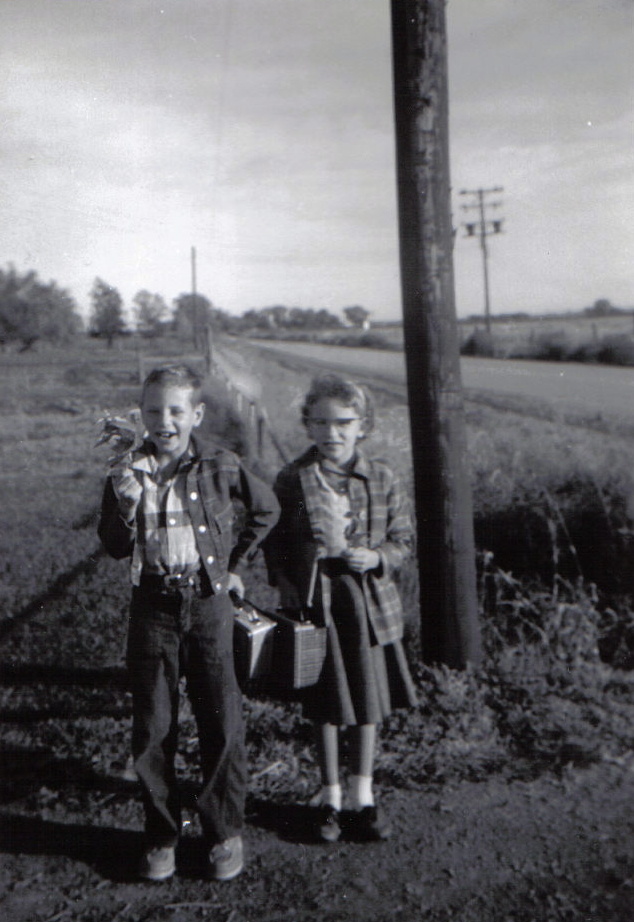
FROM THE PUBLISHER
'Crossing' series touched many
March 3, 2007
By John Temple
Rocky Mountain News

COURTESY RALPH AND ALETA CRAVEN
Calvin and Ellen Craven stand out at the road waiting for the school bus, several months before they were both killed when a train hit their bus Dec. 14, 1961.
I remember curling up under the covers as a boy and disappearing into the pages of storybooks. That was one kind of reading, the kind where my imagination soared beyond the tree outside my window, to a world where sorrow and triumph were as real as the bird songs that woke me on spring mornings. I also remember lying stretched out on our living room carpet, poring over the sports section of our local newspaper, tracking the daily ups and downs of characters in whose cleats I wished I could walk.
In those days, I dreamed of becoming a sportswriter. That never happened. But as editor of the Rocky Mountain News, it's my hope to give readers the same satisfaction I got as a boy from both types of stories.
Today I want to talk about "The Crossing," a story whose meaning is more universal than who scored the key goal in a hockey game.
This week we received a letter that raised and eloquently answered central questions about the series that ended Friday.
"I have a confession to make," Terri Thaler, of Denver, wrote to reporter Kevin Vaughan and photographer Chris Schneider. "When I first read in the RMN many weeks ago that they would be starting a series based on the horrific Weld County train/school bus collision that happened on Dec. 14, 1961, my initial response was 'UGH!!' Was the Rocky so desperate for stories that they not only have to dredge up the tragic, bloody details of that terrible day, but, worse than that, they were actually going to send out a reporter and photographer to interview the survivors and relatives of the non-survivors to force them to relive that horror!
"I told myself that I was NOT going to let myself get sucked into reading something that to my mind was intended, purely, to pander to people's negative emotions.
"What has prompted me, though, to write to both of you and express my sincere apologies for my original reaction to your remarkable series, was a letter that was printed last Saturday in the Rocky's Talk Back to the Media Opinion page.
"Basically, what this reader was saying is that this accident happened a long time ago … and, therefore, the Rocky, being a NEWSpaper, has no business going on endlessly about something that happened that is no longer NEWS!
"But, if I could, I would tell this reader that he's wrong … because while the main function of a newspaper may be to report news — it also exists to remind us what it means to be fully human — to arouse our compassion, curiosity, and other human emotions that stir us to look at what is enduring and true. And that," Thaler wrote, "is what your remarkable series has done for me. For that I thank you from my heart."
Thank you, Terri. You got it.
You weren't the only one. The response to the series has been gratifying. If you haven't gone to RockyTalkLive on our Web site to read what people have been saying, I would encourage you to do so. The series' impact was profound. Nearly 700 people showed up to a forum in Greeley to hear from our journalists, including seven of the children who survived and 12 siblings of children who died in the crash. I've never heard of anything like that.
We've also never seen this kind of commitment to an online story. It's been the No. 1 story on our site for most days the past six weeks. Let me share just a few of the strange measurements of the Web world. The Crossing pages on RockyMountainNews.com have been viewed more than 700,000 times. Readers have downloaded more than 45,000 documents, the most popular being the front page of the Greeley Tribune from the day of the crash. Visitors spent on average 7.3 minutes on a Crossing page, because of the compelling videos, photos and other features. And, of course, because they valued reading the stories. Think about how you surf the Web. Now think about spending seven minutes in one place online.
Something held them there. I happen to believe it was the power of a well-told story. I believe that is something that newspapers must provide, in print and online. I believe that storytelling hooks readers the way I was hooked as a boy by the books I read in the warmth of my bed.
That is why you have seen many gripping stories in the Rocky before "The Crossing" and why you'll see many more in the days to come.
But perhaps never another like "The Crossing."
Next: Journalism's journey: 'Crossing' author amazed by liberties of earlier era — March 10, 2007

COURTESY RALPH AND ALETA CRAVEN
Calvin and Ellen Craven stand out at the road waiting for the school bus, several months before they were both killed when a train hit their bus Dec. 14, 1961.
Back to Index